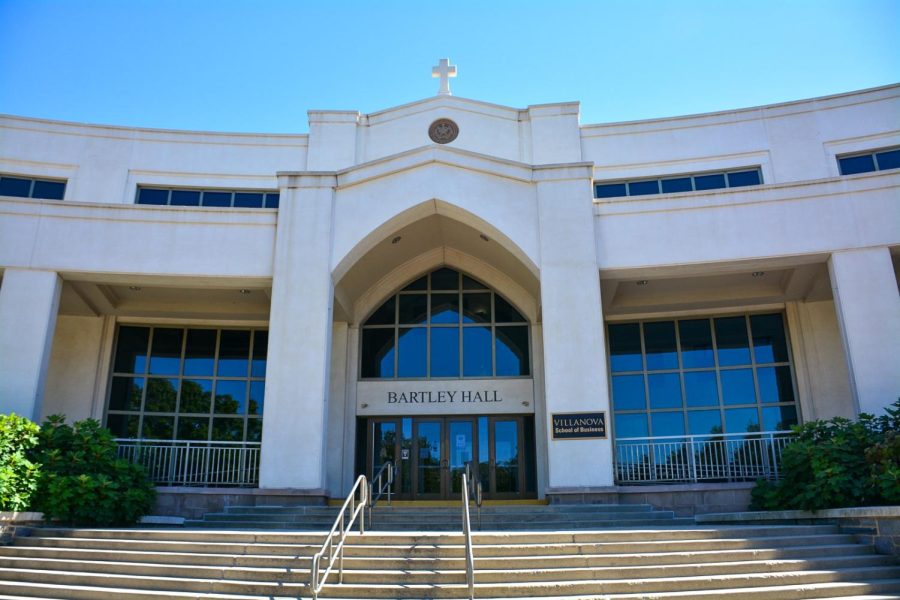As a part of Sexual Assault and Violence Awareness Month, the undergraduate organization Sexual Assault and Prevention Awareness (SAPA) Club partnered with the University’s Title IX office, student organization It’s On Us ‘Nova, and the Delaware County Victim Assistance Center on Tuesday, April 16 to host a sexual assault response panel.
The panel featured campus and community experts about sexual assault response and resources, including University nursing professor Gwendolyn Morris, Ryan Rost, the University’s Title IX coordinator, and Candice Linehan, an employee at the Delaware County Victim Assistance Center.
SAPA was responsible for coming up with the idea for the event, as well as the subsequent planning that took place.
“We were really excited a member of SAPA’s Executive Board contacted our office looking to partner on this as part of Sexual Assault Awareness Month (SAAM),” Rost said. “This panel was really important to help educate community members on treatment, resources, and process options should they or someone they know experience sexual assault.”
Those involved with the panel’s planning were pleased with the turnout and how much the audience learned from the panelists.
“The panel had more students attend than we had planned,” SAPA president, Hope Frantz, said. “So many individuals participated and asked questions.”
Frantz, now a junior, founded SAPA during her sophomore year.
“I remember hearing heartbreaking stories during my freshman year about how individuals did not feel safe on campus and in the surrounding areas,” she said. “After my friends and I talked about these concerns, we decided to band together to create S.A.P.A. to ensure a welcoming and secure club that will offer students resources and educate them on measures to take in order to help others.”
Frantz hopes that events like this can help dispel the stigma surrounding talking about sexual assault.
“I think by having these uncomfortable conversations and actually sparking discussions on the reality of assault and harassment is a way to illuminate the truth of the issue and unite people together to break the stigma of sexual assault and harassment,” she said.
Linehan shared the common stigma surrounding the topic.
“I believe it’s three-part,” Linehan said. “The stigma that society places on victims, the victim blaming and shaming. The blame, shame and guilt that the victim/survivor internalizes and the misinformation about services, process and procedures available.”
As a nursing professor, Morris said she wants to continue working to prevent sexual assault while training her students to do the same.
“From a nursing standpoint, sexual assault causes a myriad of negative physical and mental health outcomes,” Morris said. “Nurses play an important role in decreasing the incidence and reducing the impact of sexual assault on survivors. I continue to do the work that I do because in nursing the goal is to move from tertiary prevention, addressing the lasting consequences of victimization, to primary prevention, intervening before violence has occurred.”
Attendees of the panel were exposed to resources and information regarding response to sexual assault.
“They learned that survivors has options – options for evidence collection, STI/pregnancy/predatory drug testing (free at the student health center for survivors), advocacy, medical attention, emotional support, financial support, academic support, requesting no contact orders, criminal reporting, University reporting, formal and informal resolutions, civil protections and much more,” Rost said.
Morris shared her experience providing care for victims from a medical perspective.
“I discussed what kind of care students could expect from the Health Center, as well as care that occurs in a hospital setting after a sexual assault,” she said.
Linehan wanted students to know they are never alone when dealing with these incidents.
“Every person deserves the right to feel safe,” she said. “Every person deserves to be believed.”
The panelists and planning committee hoped that the event would be the start of a lasting conversation on campus, with a goal of changing campus climate.
“A crucial reason to host this panel and other similar such events is to start and continue the conversation about sexual violence within our community, which we hope will lead to promoting culture change,” Rost said.
Frantz highlighted the importance of this dialogue because it’s the beginning of creating lasting change.
“By sharing opinions, views and stories, we can work to change the hurtful narrative. Through this we can help survivors and bystanders recover and seek help and change the world,” Frantz said.









